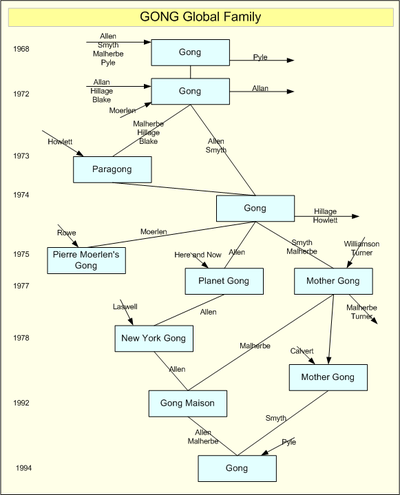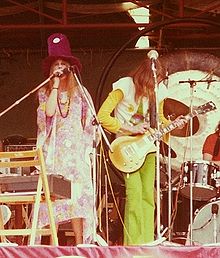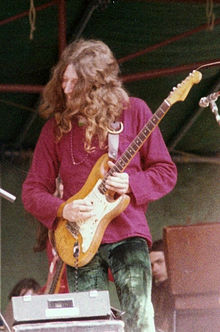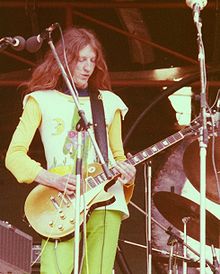- Gong (band)
-
Gong 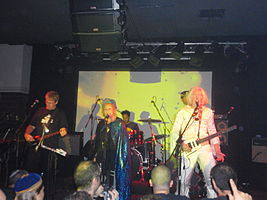
Gong live in Tel Aviv, 31 October 2009
Steve Hillage, Gilli Smyth, Chris Taylor, Dave Sturt, Daevid Allen (from left to right)Background information Origin France Genres Progressive rock, psychedelic rock, space rock, jazz fusion Years active 1967–present Associated acts Pierre Moerlen's Gong Website Official Website Members Daevid Allen
Gilli Smyth
Steve Hillage
Miquette Giraudy
Theo Travis
Chris Taylor
Dave SturtPast members Mark Hewins
Didier Malherbe
Pip Pyle
Laurie Allan
Christian Tritsch
Tim Blake
Pierre Moerlen
Mireille Bauer
Shyamal Maitra
Bill Bruford
Graham Clark
Gwyo Zepix
Kawabata Makoto
Josh Pollock
Gabe Rogasner
Cotton Casino
Orlando Allen
Fred Barley
Fabio Golfetti
Gabriel Costa
Mike Howlett
Ian EastGong is a Franco-British progressive/psychedelic rock band formed by Australian musician Daevid Allen. Their music has also been described as space rock. Other notable band members include Allan Holdsworth, Tim Blake, Didier Malherbe, Pip Pyle, Gilli Smyth, Steve Hillage, Francis Moze, Mike Howlett and Pierre Moerlen. Others who have, albeit briefly, played in Gong include Bill Bruford, Brian Davison and Chris Cutler.
Contents
History
Early years
Gong was formed in 1967, after Allen—then a member of Soft Machine—was denied re-entry to the United Kingdom because of a visa complication. Allen remained in France where he and a London-born Sorbonne professor, Gilli Smyth, established the first incarnation of the band. This line-up, including Ziska Baum on vocals and Loren Standlee on flute,[1] fragmented during the 1968 student revolution, with Allen and Smyth forced to flee France for Deià in Majorca.
They allegedly found saxophonist Didier Malherbe living in a cave in Deià, before film director Jérôme Laperrousaz invited the band back to France to record the soundtrack of his movie Continental Circus. They were subsequently approached by Jean Karakos of the newly formed independent label BYG and signed a multi-album deal with them (Magick Brother/Mystic Sister, Camembert Electrique and Allen's solo album Bananamoon were all released on BYG).
Gong played at the second Glastonbury Festival in June 1971 (the performance being issued as a side-long track on the 3-LP vinyl festival record release, later re-mixed and re-edited and released by GAS in 2001), followed by a UK tour in Autumn. In late 1972 they were one of the first acts to sign to Virgin Records, getting first pick of the Manor Studio's time ahead of Mike Oldfield.[citation needed] By that time, a regular line-up had been established, and Gong released their Flying Teapot album in May 1973. The following year, Camembert Electrique was given a belated UK release, priced at 59p which was the price of a typical single, a promotional gimmick Virgin had done before in 1973 on an album by Faust, and would do again for a reggae compilation in 1976. These ultra-budget albums sold in large quantities because of the low price, but this pricing made them ineligible for placement on album charts. The intention was that purchasers would be encouraged to buy the groups' other albums at full price.
Radio Gnome
Between 1973 and 1974, Gong, now augmented by guitarist Steve Hillage, released their best-known work, the "Radio Gnome Trilogy", three records that expounded upon the (previously only hinted at) Gong mythology, Flying Teapot, Angel's Egg, and You. For about two months at the end of 1974, Bill Bruford played drums with Gong.[2] At a gig in Cheltenham, in 1975, Allen refused to go on stage, claiming that a "wall of force" was preventing him, and left the band. With both Smyth, who wanted to spend more time with her two children, and synth player Tim Blake having jumped off in previous months, this marked the end of the 'classic' line-up. The band continued, touring the UK in November 1975 (as documented on the 2005 release Live in Sherwood Forest '75) and working on their next album Shamal with Jorge Pinchevsky on violin, but Hillage, who had been the band's de facto leader since Allen's exit, and his partner Miquette Giraudy, who had taken over from Smyth in late 1974, left before Shamal was released in early 1976. They re-joined the band briefly for a 1977 live reunion in Paris.[3]
Pierre Moerlen's Gong and other off-shoots
Drummer Pierre Moerlen, who had been persuaded by Virgin to rejoin Gong as a co-leader with Malherbe (after his spell with the French contemporary ensemble Les Percussions De Strasbourg) in 1975, gradually took over the band's leadership. When Malherbe, the only remaining founding member, finally left in 1977, Moerlen formed a new percussion-based line-up with American bassist Hansford Rowe and percussionists Mireille Bauer and Benoit Moerlen. To avoid confusion, it became known as Gong-Expresso, and from 1978 on, as Pierre Moerlen's Gong.
Allen, however, continued to develop the Gong mythology from the late seventies up until the nineties in his solo work, and with bands such as Euterpe, Planet Gong (which comprised Allen and Smyth playing with the British festival band Here & Now), and New York Gong (comprising Allen and the musicians who would later become known as Material), while Smyth formed a separate band Mother Gong, with Jean-Paul Vivini from the band Can AM Des Puig (author of The Book of AM produced by Daevid Allen), playing in Spain and England. Allen delighted in this proliferation of groups and considered his role at this time to be that of an instigator, travelling around the world leaving active Gong-related bands in his wake.
Reunions and Acid Mothers Gong
After spending most of the eighties in his native Australia, Allen returned to the UK in 1988 with a new project, the Invisible Opera Company of Tibet, whose revolving cast included the likes of Harry Williamson, violinist Graham Clark and Didier Malherbe. This morphed into GongMaison and by 1992, the name Gong was again in use, by which time early drummer Pip Pyle had also rejoined. The band released the album Shapeshifter (subsequently dubbed Radio Gnome part 4), followed by extensive touring. In 1994, Gong celebrated its 25th birthday in London, including a performance by most of the 'classic' line-up, including the returning Gilli Smyth and Mike Howlett. This formed the basis of the "Classic Gong" band which toured worldwide from 1996 to 2001 and released Zero to Infinity in 2000 (by Allen, Smyth, Howlett and Malherbe plus new recruits Theo Travis and Chris Taylor).
However, 2003 saw a radical new line-up called Acid Mothers Gong, including Acid Mothers Temple member Kawabata Makoto and University Of Errors guitarist Josh Pollock. Allen and Smyth's son Orlando Allen drummed on the album Acid Motherhood, but the drummer on most of the band's live dates was Ruins drummer Tatsuya Yoshida.
The "Classic Gong" line-up retired from regular touring in 2001, but there were one-off reunions subsequently, most notably at the "Gong Family Unconvention" (Uncon), the first of which was held in 2004 in the Glastonbury Assembly rooms as a one day event and featured many ex members and Gong family bands including Here and Now, House of Thandoy, Thom the Poet, Invisible Opera, Andy Bole, Bubbledub and Joie Hinton. The 2005 Uncon was a 2-day affair featuring several Gong-related bands such as Here & Now, System 7, House of Thandoy and Kangaroo Moon. The most recent Uncon was a 3-day event held at the Melkweg in Amsterdam on 3–5 November 2006, with practically all Gong-related bands present: classic Gong (with Allen, Smyth, Malherbe, Hillage, Blake and Howlett, plus Miquette Giraudy, Chris Taylor and Theo Travis), System 7, Steve Hillage Band, Hadouk, Tim Blake & Jean-Philippe Rykiel, University of Errors, Here & Now, Mother Gong, Zorch, Eat Static, Acid Mothers Gong, Slack Baba, Kangaroo Moon and many others. These events have all been compèred by "Thom the Poet (now Thom Moon 10)".[4]
In November 2007, Daevid Allen held a series of concerts in Brazil, with a branch of Gong, which was called Daevid Allen and Gong Global Family (Daevid Allen on vocals and guitar, Josh Pollock on guitar, megaphone and percussion; Fred Barley on drums and percussion; Fabio Golfetti on guitar, bass Gabriel Costa, Marcelo Ringel on flute and tenor saxophone), along with his other band University of Errors (Allen, Josh Pollock, Michael Clare, Fred Barley). The presentations took place in Sao Paulo on 21 and 22 November and San Carlos on November 24. These musicians - less Marcelo - recorded some new songs in the studio Mosh, in Sao Paulo. The Sao Paulo concert - 21 november - was then released only in England as DVD and CD by Voiceprint Records.
More recently in June 2008, Gong played two concerts in London: Queen Elizabeth Hall on the Southbank (opening Massive Attack's Meltdown festival) and the Forum, with Allen, Smyth, Hillage, Giraudy, Howlett, Taylor and Travis among the lineup. This line-up then released new album 2032 in 2009 and toured in support. They played the Glade stage at Glastonbury Festival with Steve Hillage and Miquette Giraudy. Gong played at the Big Chill festival in the UK between on 9 August 2009 with Allen, Smyth, Hillage, Giraudy, Sturt, Taylor and Travis in the line up, at the Beautiful Days Festival in Devon, 23 August 2009, and at the Lounge on the Farm festival near Canterbury in the summer of 2009.
Gong played four UK live shows in September 2010 with Allen, Smyth, Hillage, Giraudy, Sturt, Taylor and Ian East[5]: O2 ABC Glasgow (9th), Manchester Academy (10th), HMV Forum London (11th) and HMV Institute Birmingham (20th). Support for these shows was provided by Nik Turner's Space Ritual.
Mythology
The Gong mythology has been published on the Planet Gong website.[6]
Flying Teapot (1973): Radio Gnome Trilogy, Part 1
Gong mythology is a collection of recurring characters, themes, and ideas that permeate the rock albums of Daevid Allen and Gong and to a lesser extent the early works of Steve Hillage. The story is based on a vision Allen had during the full moon of Easter, 1966 in which he claims he could see his future laid out before him. The mythology is hinted at through all of Gong's earlier albums but is not the central theme until the "Radio Gnome Trilogy" (1973–1974).
The story begins on the album Flying Teapot (1973) when a pig-farming Egyptologist called Mista T Being is sold a "magick ear ring" by an "antique teapot street vendor & tea label collector" called Fred the Fish. The ear ring is capable of receiving messages from the Planet Gong via a pirate radio station called Radio Gnome Invisible. Being and Fish head off to the hymnalayas of Tibet (sic) where they meet the "great beer yogi" Banana Ananda in a cave. Ananda tends to chant "Banana Nirvana Mañana" a lot and gets drunk on Foster's Australian Lager.
This latter development mirrors the real-life experience of band members Daevid Allen and Gilli Smyth who met their saxophonist, Didier Malherbe, in a cave in Majorca.
Meanwhile, the mythology's central character, Zero the Hero, is going about his everyday life when he suddenly has a vision in Charing Cross Road. He is compelled to seek heroes and starts worshipping the Cock Pot Pixie, one of a number of Pot Head Pixies from the Planet Gong. These pixies are green with propellers on their heads, and they fly around in teapots.
Zero is soon distracted by a cat which he offers his fish and chips to. The cat is actually the Good Witch Yoni, who gives Zero a potion. This concludes the first album of the Radio Gnome Trilogy.
Angel's Egg (1973): Radio Gnome Trilogy, Part 2
The second album Angel's Egg (1973) begins with Zero falling to sleep under the influences of the potion and finding himself floating through space. After accidentally scaring a space pilot called Captain Capricorn, Zero locates the Planet Gong, and spends some time with a prostitute who introduces him to the moon goddess Selene.
Zero's (drug-induced) trip to the Planet Gong continues, and the Pot Head Pixies explain to him how their flying teapots fly (a system known as Glidding). He is then taken to the One Invisible Temple of Gong.
Inside the temple, Zero is shown the Angel's Egg—the physical embodiment of the 32 Octave Doctors (descendants of the Great God Cell). The Angel's Egg is the magic-eye mandala that features on much of the band's sleeve-art. It is also a sort of recycling plant for Pot Head Pixies.
A grand plan is revealed to Zero. There will be a Great Melting Feast of Freeks which Zero must organize on Earth. When everyone is enjoying the Feast, a huge global concert, the Switch Doctor will turn everybody's third eye on, ushering in a New Age on Earth. The Switch Doctor is the Earth's resident Octave Doctor, who lives near Banana Ananda's cave, in a "potheadquarters" called the Invisible Opera Company of Tibet (C.O.I.T.) and transmits all the details to the Gong Band via Bananamoon Observatory.
You (1974): Radio Gnome Trilogy, Part 3
In the third installment, You (1974), Zero must first return from his trip. He asks Hiram the Master Builder how to structure his vision and build his own Invisible Temple. Having done this, Zero establishes that he must organize the Great Melting Feast of Freeks on the Isle of Everywhere, Bali.
The event is going well, and the Switch Doctor switches on everyone's third eyes except for Zero's. For Zero is out the back, indulging in Earthly pleasures (fruitcake).
Zero has missed out on the whole third eye revelation experience and is forced to continue his existence spinning around on the wheel of births and deaths and slowly converging on the Angel's Egg in a way which, to a certain extent, resembles Buddhist reincarnation.
Continuations
In episode four in the album Shapeshifter (1992), Zero meets an urban shaman who agrees to take Zero to the next level of awareness on the proviso that Zero spends nine months on an aeroplane travelling where he wants but not using money or eating anything other than airline food. Zero eventually dies in Australia under mysterious circumstances.
The last installment in the album Zero to Infinity (2000) sees Zero's spirit enjoying a body-free and virtual existence. During the course of this he becomes an android spheroid Zeroid. With the help of a strange animal called a gongalope, he learns that all the wisdom of the world exists within him and practices Lafta yoga and tea making. At the end he becomes one with an Invisible Temple and has a lot of fun.
Gong's mythology is not universally serious. Great amounts of the story pertain in some way to the production and consumption of tea (perhaps suggesting mushroom tea, although the word tea has also long been a word to describe cannabis, especially in the 1940s and 1950s). The characters of the story are often based on or used as pseudonyms for band members.
Discographies
Studio albums
- 1970: Magick Brother
- 1971: Camembert Electrique
- 1971: Continental Circus
- 1971: Obsolete (Dashiell Hedayat)
- 1973: Flying Teapot
- 1973: Angel's Egg
- 1974: You
- 1975: Shamal
- 1980: About Time (as New York Gong)
- 1989: Gong Maison (Gongmaison)
- 1992: Shapeshifter
- 1996: The Peel Sessions 1971-1974
- 2000: Zero to Infinity
- 2004: Acid Motherhood
- 2009: 2032
Mother Gong albums
- 1979: Fairy Tales
- 1981: Robot Woman
- 1982: Robot Woman 2
- 1986: Robot Woman 3
- 1988: Fish In The Sky
- 1990: The Owl And The Tree (with Daevid Allen)
- 1991: Wild Child
- 1993: She Made The World Magenta
- 1994: Eye
- 1994: Tree In Fish
- 2005: I Am Your Egg
Pierre Moerlen's Gong albums
- 1976: Gazeuse!, also known as Expresso
- 1978: Expresso II
- 1979: Downwind
- 1979: Time is the Key
- 1980: Pierre Moerlen's Gong: Live
- 1981: Leave It Open
- 1986: Breakthrough
- 1988: Second Wind
- 1998: Full Circle Live '88
- 2004: Pentanine
Live albums
- 1971: Glastonbury Fayre (Gong contribute one side to this live triple album)
- 1973: Greasy Truckers Live at Dingwalls Dance Hall
- 1977: Gong est Mort, Vive Gong (French live album)
- 1977: Gong Live Etc (UK live album)
- 1977: Floating Anarchy Live (Planet Gong)
- 1990: Live At Sheffield '74
- 1990: Live au Bataclan 1973
- 1992: Live 1991 (Mother Gong)
- 1993: Live On T.V. 1990
- 1995: 25th Birthday Party
- 1995: Live Floating Anarchy 1991
- 1995: The Peel Sessions 1971/1974
- 2000: Live 2 Infinitea
- 2002: Glastonbury 1971
- 2005: Glastonbury '79-'81 (Mother Gong)
- 2005: Live In Sherwood Forest '75
- 2006: Acid Mothers Gong Live Tokyo (Acid Mothers Gong)
- 2007: Mothergong O Amsterdam (Mother Gong)
- 2009: Gong Global Family - Live in Brazil 2007
Compilation albums
- 1987: Wingful of Eyes
- 1995: The Best Of Gong
- 1997: The Very Best Of Gong
- 1998: Best Of Mother Gong
- 2003: The World of Daevid Allen and Gong (3 CD compilation including almost all of the Radio Gnome trilogy & early album tracks)
References
- ^ [1]
- ^ See in the gigs section of Planet Gong's website
- ^ "Planet Gong: Tribal Heart: Gig History: 1977". http://www.planetgong.co.uk/octave/gighistory/1977.shtml. Retrieved 2006-09-20.[dead link]
- ^ "Thom the Poet (now Thom Moon 10)"
- ^ See under Gong 2010 dates in the News section of Planet Gong's website
- ^ Planet Gong: Cosmologistix: Code Glossary Retrieved 2010-03-01.
Further reading
- Allen, Daevid. Gong Dreaming 1 (SAF Publishing) ISBN 0-946719-82-9
- Allen, Daevid. Gong Dreaming 2 (SAF Publishing) ISBN 0-946719-56-3
- Brown, Brian. "Gong: Angel's Egg", (Crawdaddy!) March 26, 2008
External links
- Official web site for Gong, GAS & Gliss
- The Archive - Archival photos of Gong,Mother Gong,Steve Hillage, Nik Turner, Here & Now,Hawkwind and many Free Festivals from the 60s-80s
- Acid Mother voted weirdest album cover of all time
- Gong at calyx.perso.neuf.fr, the "Canterbury website"
- "Not Just Another Gong Website" - comprehensive tapeography
Gong Daevid Allen · Gilli Smyth · Orlando Allen
Steve Hillage · Mark Hewins · Mike Howlett · Didier Malherbe · Pip Pyle · Laurie Allan · Christian Tritsch · Tim Blake · Pierre Moerlen · Mireille Bauer · Miquette Giraudy · Shyamal Maitra · Graham Clark · Theo Travis · Chris Taylor · Kawabata Makoto · Josh Pollock · Gabe Rogasner · Cotton Casino · Francis Moze · Fabio Golfetti · Fred Barley · Gabriel CostaStudio albums Magick Brother · Camembert Electrique · Continental Circus · Flying Teapot · Angel's Egg · You · Shamal · Shapeshifter · Zero to Infinity · Acid Motherhood · 2032Pierre Moerlen's Gong New York Gong About TimeMother Gong Fairy Tales · The Owl and the TreeLive albums Greasy Truckers Live at Dingwalls Dance Hall · Glastonbury Fayre · Gong est Mort, Vive Gong · Gong Live Etc · Floating Anarchy Live 1977 · Live In Sherwood Forest '75 · Live 2 Infinitea · Acid Mothers Gong Live Tokyo · Gong Global Family - Live in Brazil 2007Categories:- Canterbury scene
- Musical groups established in 1967
- Space rock
- French progressive rock groups
- British progressive rock groups
Wikimedia Foundation. 2010.

